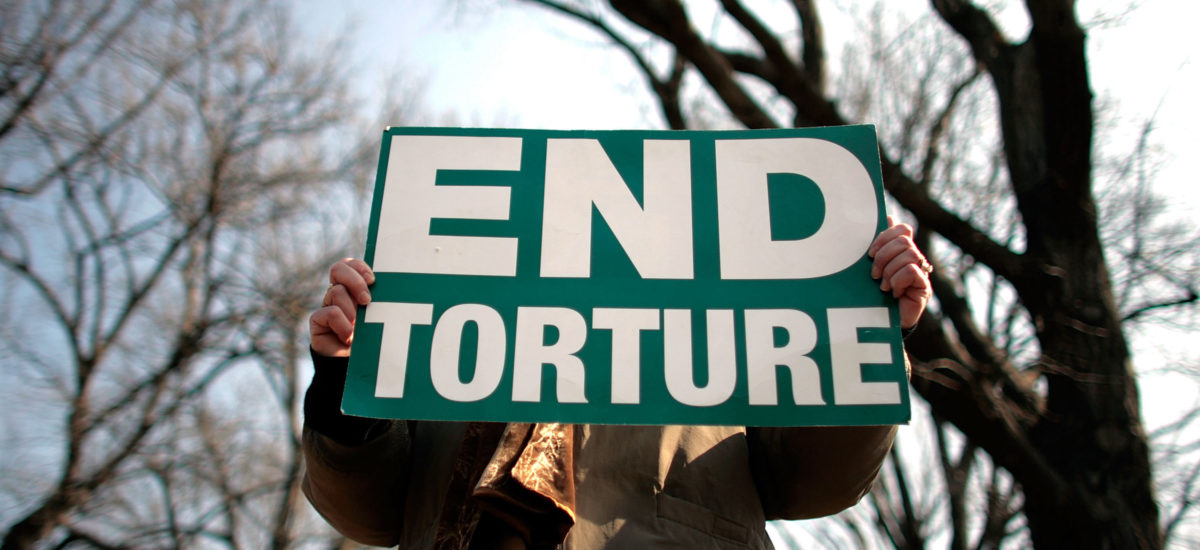Photo courtesy of The Boston Globe
Today is the International Day in Support of Victims of Torture
“The term ‘torture’ means any act by which severe pain or suffering, whether physical or mental, is intentionally inflicted on a person for such purposes as obtaining from him or a third person information or a confession, punishing him for an act he or a third person has committed or is suspected of having committed, or intimidating or coercing him or a third person, or for any reason based on discrimination of any kind, when such pain or suffering is inflicted by or at the instigation of or with the consent or acquiescence of a public official or other person acting in an official capacity.” Convention against Torture and other Cruel, Inhuman or Degrading Treatment or Punishment.
In 1977, the United Nations General Assembly took the first step towards the drafting and adoption of a legally binding instrument on torture. Recognizing that additional international efforts were required to protect individuals from torture, the General Assembly requested the Commission on Human Rights to draft the Convention the Convention against Torture and Other Cruel, Inhuman or Degrading Treatment or Punishment, which was adopted in December 1984 by consensus at the UN General Assembly.
The General Assembly proclaimed June 26 the United Nations International Day in Support of Victims of Torture with a view to the total eradication of torture and the effective functioning of the convention. There are 173 State parties to the convention.
Sri Lanka accepted the convention in 1994. The act of the convention was passed in parliament as it was necessary to impose provisions for implementing the commitment of Sri Lanka under the international convention. The act was Sri Lanka’s first achievement in ratifying the convention as it criminalizes torture and other cruel, inhuman or degrading treatment. Torture is considered to be a non-bailable offence and state of war, threat of war, public emergencies or an order from a superior would not be consider as a defense of torture.
However, this act has not been applied properly and fairly by the authorities.
The TNA Parliamentarian President’s Counsel M.A Sumanthiran in his speech in parliament at the debate of the amendment of the Act in July, 2021 said, “The Convention Against Torture and other Cruel, Inhuman or Degrading Treatment or Punishment Act was passed in 1994 and we have various researches that have been made with regard to the efficacy of this Act. 26 years of this Act has seen just 9 convictions, 6 of which are under appeal. Very recent research publication by Law and Society Trust says that there were only 47 prosecutions – only 47 prosecutions! Less than 0.1 % of the complaints that are made. And one knows that even the complaints are only about 10, 20% of the actual happenings”.
The Attorney General’s Department has filed only 115 cases under this act until 2019, according to a report by the Right to Life Human Rights Centre. However, a report handed over to the Committee Against Torture of the United Nations by the Human Rights Commission of Sri Lanka, noted that were 3,404 complaints regarding torture were received from 2010 to 2016.
The gap between the actual incidents of torture and prosecutions can be seen clearly by the statistics.
The Asia Director of the Human Rights Watch, Bryan Adams, said, “One of the saddest things about these cases is that, although Sri Lanka has decent laws to protect against such abuse, these laws seem to be treated as mere suggestions and not as required police procedures…Arbitrary arrest and other police mistreatment end up contributing to the use of torture. The police are meant to protect and uphold rights, not be the torchbearers of dismantling rights.”
The US State Department’s Country Reports for 2022 also raised the issue. “The constitution and law prohibit such practices, but authorities reportedly employed them. Human rights and civil society organizations alleged that torture and excessive use of force by police, particularly to extract confessions, remained endemic. The HRCSL, for example, noted that many reports of torture referred to police allegedly “roughing up” suspects to extract a confession or otherwise elicit evidence. As in previous years, arrestees reported torture and mistreatment, forced confessions, and denial of basic rights, such as access to lawyers or family members. On November 15, the National Police Commission reported that it received approximately 1,200 complaints against police during the year. From January to September 30, the HRCSL documented 291 complaints of torture, compared with 302 for all of 2021.”
Freedom from torture and other cruel inhuman or degrading treatments is a fundamental right guaranteed by the constitution. In the judgment, W.M.K. De Silva v. Chairman of Ceylon Fertilizers Corporation, the court expanded the concept of torture to include mental and emotional suffering.
“Torturers must never be allowed to get away with their crimes, and systems that enable torture should be dismantled or transformed,” said UN Secretary General Antonio Guterres.
To eliminate the prevailing illegal and uncivilized system of torture in Sri Lanka, we should work together to dismantle the social constructs that condone torture.

